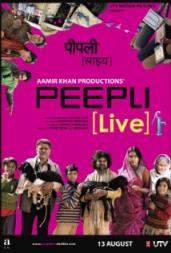Subscribe to Our Newsletter
Special Offer from PM Press
Now more than ever there is a vital need for radical ideas. In the four years since its founding - and on a mere shoestring - PM Press has risen to the formidable challenge of publishing and distributing knowledge and entertainment for the struggles ahead. With over 200 releases to date, they have published an impressive and stimulating array of literature, art, music, politics, and culture.
PM Press is offering readers of Left Turn a 10% discount on every purchase. In addition, they'll donate 10% of each purchase back to Left Turn to support the crucial voices of independent journalism. Simply enter the coupon code: Left Turn when shopping online or mention it when ordering by phone or email.
Click here for their online catalog.
Casualties of Commerce
 PEEPLI LIVEBY ANUSHA RIZVIAamir Khan Productions, 2010
PEEPLI LIVEBY ANUSHA RIZVIAamir Khan Productions, 2010
Since 1997, India has seen more than 200,000 farmers’ suicides. The grim statistics now amount to about 17,000 per year, averaging almost 50 suicides per day. The number of farmers’ suicides has risen even as the agricultural population has declined, as many farmers have abandoned the fields for jobs in India’s cities, many becoming underpaid and overworked construction workers. Rural villagers still make up 70 percent of India’s 1.2 billion population.
As reported by journalist P. Sainath in The Hindu newspaper, these are only the official numbers. The actual numbers are most certainly higher—especially since women agricultural laborers are often not officially recognized as farmers, so their suicides are not typically counted as farmers’ suicides. The causes of India’s farmers’ suicides are numerous, though most relate to the increased commercialization of the countryside in the last twenty years, which has the ramifications of decreased credit and income, and increased loans and debt—which have resulted in greater poverty and hopelessness.
Along with exposure in Sainath’s journalism, the farmers’ suicides issue has been touched on in several films—fiction and non-fiction—including the 2009 documentary Nero’s Guests. The latest and most widely released of these films is the Hindi-language fictional satire Peepli Live. The directorial debut of former journalist Anusha Rizvi, Peepli Live benefited from the production sponsorship of Bollywood megastar Aamir Khan.
The film focuses on Natha, a poor farmer in the fictional village of Peepli, who faces a huge debt burden. His brother Budhia tries to sort out what they can do, and hears of a scheme whereby if a farmer commits suicide, the government compensates his family with 100,000 rupees (about $2,000).
Word spreads that Natha has decided to commit suicide, becoming a national story overnight—a media frenzy descends upon the sleepy village of Peepli. The film provides stark and insightful contrast between the worlds of India’s big-city media companies that communicate in English, compared to the non-English-speaking, largely-illiterate farmers who sing folk songs about the rising price of diesel.
Cinematic mirror
Peepli Live also shows how politicians manipulate the media, the caste system, and elections—for their own benefit and to the dire detriment of the public. It is because of government policy that farmers are forced to buy American seed and fertilizer, causing them to enter into loans which they will never be able to repay. As Sainath notes, “The spate of farm suicides—the largest sustained wave of such deaths recorded in history—accompanies India’s embrace of the brave new world of neoliberalism.”
Somehow, Rizvi has managed to make a film about farmers’ suicides that incorporates dark humour and satire—and it works. Filmed largely in Madhya Pradesh—one of the Big 5 “suicide belt” states—Peepli Live features songs by the rock/fusion band Indian Ocean, and the cast includes the long-respected actor Naseeruddin Shah. The film holds up a mirror to Indian society that showcases the staggering realities faced by the rural poor. My favourite character in the film is Hori, a hard-working elder farmer. He symbolizes the plight of Indian toilers—he has lost his land, and is forced to dig earth which he sells. He keeps digging and digging, to no avail.
Peepli Live is a strong film that uses the mass medium of cinema in the way it should be used—to entertain, but also at the same time, to educate. The film should be noted for its clever satirical techniques in bringing the stories of India’s poor to the forefront—making us realize we shouldn’t look away, we can’t look away, that we must deal with the consequences of neo-liberalism, for they stare us in the face. Walk around any city in India, and immediately you will see a dusty construction worker, who is likely a former farmer. There are many like him, who unfortunately did not survive and took their own lives.

